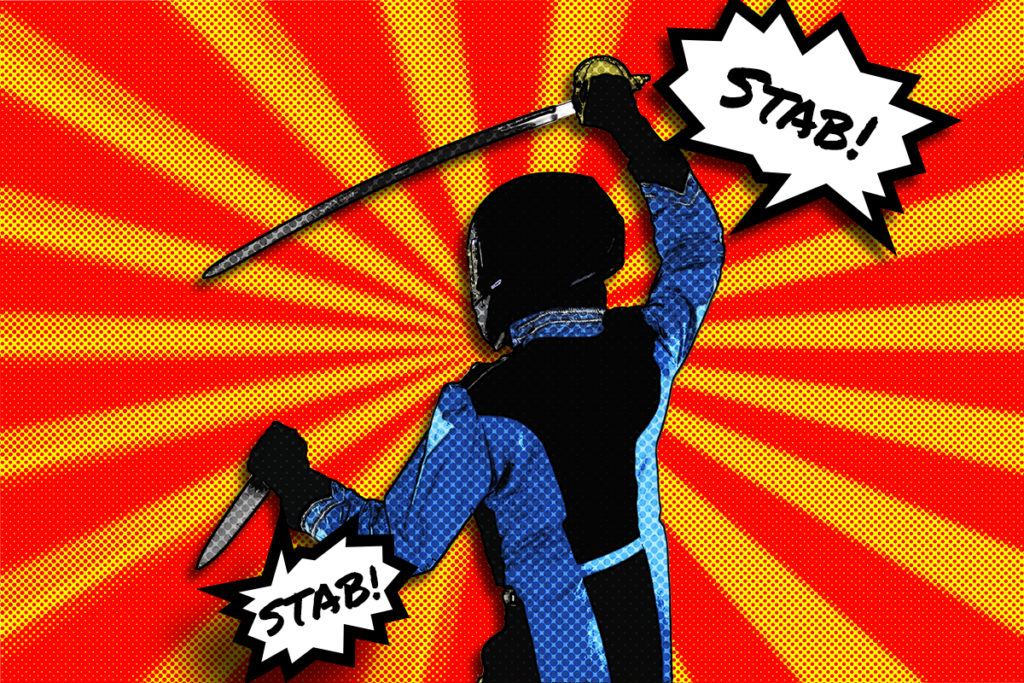
A version of this article first appeared as a multi-part series in The Diplomacy Briefing, a weekly email for those who love the board game Diplomacy.

An Introduction to Backstabbing
To some gamers, the board game Diplomacy and the concept of “backstabbing” are synonymous. (I don’t think backstabbr.com is helping with this perception.) That’s a shame. Although lying, misdirection, manipulation, and surprise attacks are a part of any Diplomacy match, true backstabbing is infrequent.
Say what!?
Don’t worry. Your Bored Brother is here to explain.
Broken Promises and Disloyalty Are Not Necessarily “Backstabbing”
I don’t consider the following situations to be backstabs:
- Lying to a non-Ally. The phrase “stab in the back” implies a certain degree of friendship or trust (as in, “he stabbed his best friend in the back!”). I think it is not appropriate to apply the phrase “stab in the back” between two players who did not consider themselves allies.
- Merely Breaking a Promise. Let’s say Germany helps England capture Belgium with the understanding that England will build a fleet the following Winter. Then England builds an army instead. That might be a broken promise to a friend, but I think it is rather extreme to describe unreliable or shifty behavior with the murderous metaphor of a “backstab.”
- Non-Deadly Aggression. Players do all sorts of ruthless actions in Diplomacy, including seizing (without warning) important positions from their allies. For example, a Turkish player might use a fleet in Black Sea to suddenly take Sevastopol from their Russian ally to ensure that the Russian cannot build at Sevastopol—while otherwise cooperating with Russia in all other respects that turn. That hurts, but it’s not deadly.
- Leaking an Ally’s Orders. In my series about why players get backstabbed, I described the “soft backstab” of a player who leaks their ally’s orders in order to frustrate their ally’s ambitions. This disloyalty, by itself, is not a stab in the back.
Thus, in my view, a player who in Spring 1901 negotiates and then violates a demilitarized zone (DMZ) has probably not “backstabbed” anybody.
In my view, a true “backstab” occurs in Diplomacy when a player betrays an ally by making a devastating surprise attack upon that ally. Specifically:
- The players have mutually agreed that they are allies; and
- The allies have agreed to make certain moves simultaneously in furtherance of that alliance; and
- One of the allies exploits their foreknowledge of the ally’s moves in order to make a surprise attack on that ally; and
- The betraying player expects the surprise attack to devastate the victim. (By “devastate” I mean outright eliminate, or at least permanently reduce to a rump state of 3 or fewer centers.)
Typically (but not necessarily!) it is players helming neighboring powers who backstab each other.
Now that you understand my definition of “backstabbing,” you can probably figure out why I claim that backstabbing is not so frequent in Diplomacy matches. But I’ll spell it out anyways: inexperienced Diplomacy players usually lack the skill or sense to set up true backstabs, and experienced Diplomacy players backstab no more than once or twice per match (often not at all!).
A well-executed backstab is exhilarating to complete and marvelous to behold. Even the victim may be impressed by the artistry (although I wouldn’t count on it). But, for the love of Pete, don’t equate all of Diplomacy to one specific tactic; I’ve played plenty of great Diplomacy matches where none of the players stabbed each other in the back.
What is a “Double Backstab?”

The Double Backstab is when a player performs a backstab exactly as I described, and then:
- Immediately proceeds to re-ally the victim; and
- Immediately backstabs the victim a second time.
By “immediately” I mean the turn or year following the original backstab.[1]If you are familiar with my writing, you will recognize that a double backstab is a type of Trojan Horse alliance.
I can hear some readers saying “how the heck do you get away with that? Aren’t you someone’s worst enemy after you’ve just backstabbed them?”
It sounds pretty crazy, no? But it can be done. I’ve done it. If you’ve played enough Diplomacy, I bet you’ve seen it happen to others (to your immense frustration, I expect), or done this yourself.

The Advantages of a Double Backstab
So…what are some of the advantages?
- A surprise attack is more effective. If you’ve decided to press your attack after your initial backstab, why not attack your rival mentally (with manipulation) as well as physically (with your pieces)? Successfully re-allying your victim likely means that they will either drop some of their defenses against you, tell you about some of their orders, or prioritize a fight against a different power over fighting with you. Any of these developments will let you choose attacks moves that are highly likely to succeed!
- You will get your share of the spoils. Have you ever attacked a power with everything you have for several turns, only for a last-minute opportunist to capture as many centers as you (or even more than you)? This happens because most Diplomacy players prioritize defense against a known enemy or biggest threat (e.g., a backstabbing ally) over an uncertain or smaller threat. In doing so, they leave their backdoor open to opportunistic attacks. The double backstab counteracts this problem by convincing your victim to prioritize other goals over defending against you.
- Your victim will be destroyed faster. Quickly dispatching a backstab victim is generally sound policy. A mauled-but-threatening rival can often be your worst enemy Diplomacy. Such players can be difficult to manipulate during endgame, and may seek revenge against you. A successful double backstab speeds up their destruction and reduces these dangers. (Bear in mind, you do not necessarily have to eliminate a rival to dispose of them as a threat; reducing them to 1 or 2 centers before moving on to other priorities might actually leave a fractured board that facilitates your solo.)
Example: ODC 2019 – R1 G28 (March 2019—June 2019)
In this match, I played as France. Because this was a preliminary match for a tournament in which I was highly seeded, I expected to be able to outplay my opponents as long as I got off to a strong start. And because the tournament used Sum-of-Squares scoring, I knew that I did not necessarily have to make a solo win to advance to the next round (since with that scoring system, topping the board typically gives a massive score).
Thus, I decided to apply my default French strategy: first conquer England, then conquer Germany, meanwhile pickup Tunis opportunistically, then roll up the rest of the North to reach 18. I knew that even if I got stuck at 14-17 centers, my final score would still be very high. Thus, I decided to focus on aggressive, selfish, ruthless play to maximize my chances of an acceptable final score (at the cost of using long-term alliances to gain a long-term advantage). Compared to the other powers, I think France does not have as much need for close or long-term alliances.
Having decided to destroy England, I wanted to make my attack as swift and devastating as possible. Accordingly, I set up a Trojan Horse alliance with England.
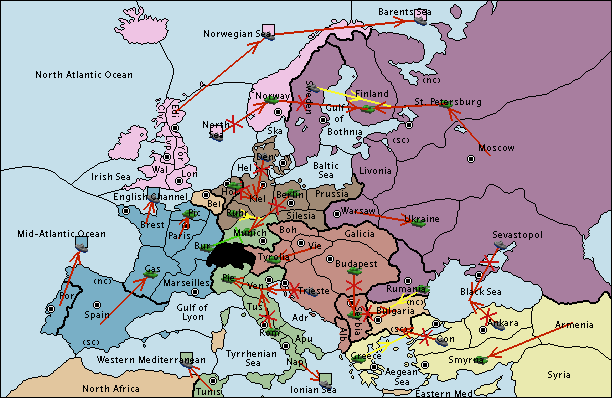
I attacked England by surprise in 1902. My Trojan Horse worked!
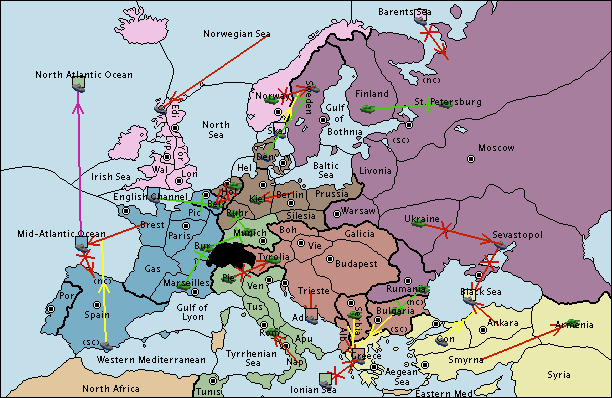
Then in 1903 I set up a second Trojan Horse alliance with England while I secretly cooperated with Italy. I attacked England with a second surprise attack in Autumn 1903 (an attack joined by Italy and Russia).
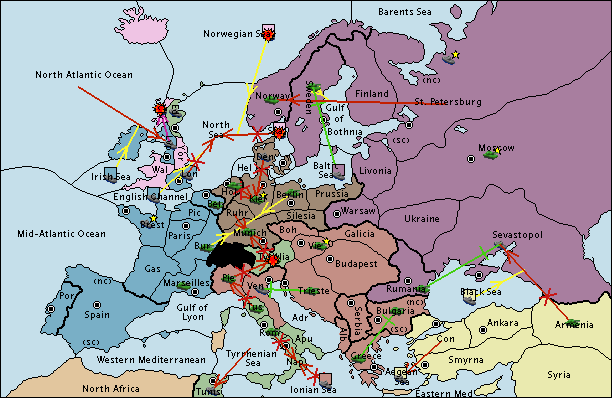
By Autumn 1904 my target, England, was destroyed—and each English home center was either under my control or easily within my reach!
The advantage to me here was enormous. Because of my successful double backstab (and my diplomacy with Italy, Germany, Russia, and even Austria), I ensured that I, France, was the primary beneficiary of England’s destruction.
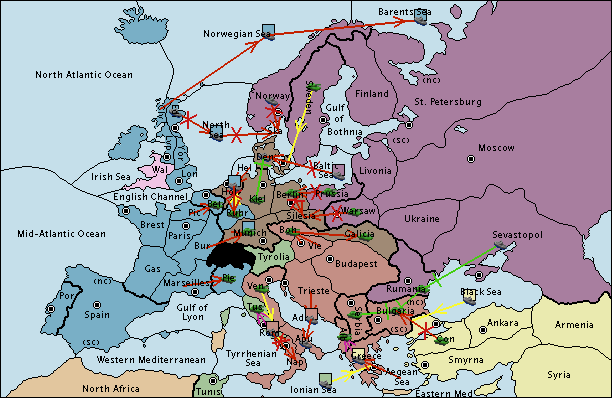
By Spring 1906 (yes, the sixth year!) I felt myself to be on the path to a solo win and initiated a solo win run.
You can click here to read a little bit more about my thoughts on this match and my approach to the tournament.
I ultimately did not solo win, but I came quite close and took more than 50% of the points (enough to qualify me for the next round). My double backstab accomplished everything I hoped it would, and was a major factor why I achieved the outcome I was hoping for from this match. I consider this match an excellent demonstration of the advantages that can be attained with a double backstab.

The Risks of a Double Backstab
The advantages of a successful double backstab are that your victim’s destruction will be swifter, more complete, and result in a greater share of the spoils going to yourself. But what are the risks of this gambit?
If You Fail, You Might Have a Permanent Enemy
The most significant risk of attempting a double backstab is that, if your double backstab does not succeed, you might create a bitter enemy who is resistant to your future communication efforts.
Attempting a deadly backstab on a player more than once will shatter that player’s willingness to trust you. They will probably infer (perhaps correctly) that you were never genuinely interested in alliance with them—that is to say, they may fear that you perceive their existence as an obstacle, not an opportunity. If a player believes that your strategy is to destroy them, they won’t trust you unless they have no other option.
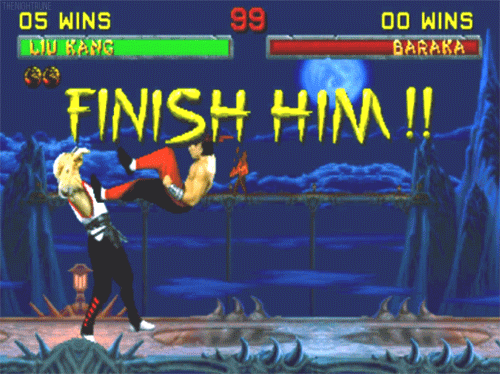
Worse than that, you might drive the player to abandon all other goals to seek revenge against you. True, there are some experienced Diplomacy players (such as Your Bored Brother) will forgive a backstab—even two! But a one-two punch to the psychic gut will sometimes enrage even the mildest player. And dealing with a player whose primary goal is to ruin your game is miserable, to say the least.
I usually say that if you backstab an ally, that ally better be destroyed by your attack so that you don’t come to regret it. This advice goes double for the double backstab. To avoid revenge, you must kill your victim dead (or at least render them tactically incapable of ever bothering you again).
You May Acquire a Reputation for Ruthlessness
The other risk of attempting a double backstab is that the other players will know what you’ve done. The other players may become wary of you, which will diminish your ability to influence them. This is not so much a risk of a double backstab as it is a cost.
To avoid paying a heavy price for your double backstab, I offer two pieces of advice:
- Get other players on board with your attack plan. If other players want you to destroy your victim quickly, then they will accept your double backstab ploy as something advantageous to them (and not something to fear). That may sound counter-intuitive, but remember that emotions always play a role in a person’s perception. So instead of thinking “the German is a ruthless player,” they may think “the German is an effective ally!”
- Inflict your double backstab as part of initiating a solo win run. If your double backstab is one part of your effort to openly go for the solo win (perhaps in conjunction with backstabs against other players!), then it won’t matter that you’ve hurt your reputation. After all, your bold solo win attempt will probably have a much stronger effect on their perception of you than the backstabbing!
How to Get Away with a Double Backstab
So—how do you take advantage of a player who you just betrayed?

Keep in Mind Your Primary Goal: Reconnaissance
Say whatever you think will induce your victim to reveal their moves for the coming turn. You can agree to anything, and you can offer anything—so long as your offers are convincing and necessitate that your victim move their pieces in some predictable way.
You don’t actually have to get your victim to flat-out tell you what their moves will be; if you have convinced your victim that you are ready to re-ally, then you can probably infer what your rival’s moves will be.
Dodge Their “Backstab Spider-sense”

Most Diplomacy players have a “backstab spider-sense.” To succeed with any backstab, you want to avoid tingling your victim’s backstab spider-sense.
There are limitless subtle things that you might activate your rival’s anxiety that you are about to backstab them. Indeed, if there is no plausible strategic reason for you to genuinely re-ally your victim, a canny player will know that you are just lying.
But let’s assume it is somehow possible to trick your opponent. Based on my years of experience (successfully!) playing Diplomacy, and my general knowledge of the human psyche, here are some techniques that I believe avoid the backstab spider-sense:

- Let your victim ask for mercy. If your backstab victim asks you to re-ally, and it seems like a credible offer…take them up on it! In general, in Diplomacy, it is to your advantage to let rival players think your ideas are actually their ideas. Create a press environment where it seems like they have few options—and then wait to see if they ask you.
- Say your stab was a mistake, or that you regret stabbing. Some players will admit that backstabbing them was a smart move…but not many. They’ll warn you how you’ll come to regret the backstab, that someone else will benefit much more than you, you’ll lose to someone else’s solo, etc. If your victim starts talking like that…why not agree? Agree that your stab was a mistake, and say that you regret attacking them. Ask your victim what they would like you to do to re-form the alliance. Don’t offer them everything or the offer will not be credible.
- Find out if they will become your Janissary. In Diplomacy jargon, a “janissary” is a half-destroyed power that becomes the puppet of a stronger power in return for extra turns of life. This is a common strategy, so both of you could credibly agree that your former ally will now be your janissary. Then abuse your janissary’s servility to set them up for a second stab!
- Show your rival that there is no alternative. Oftentimes, your now-betrayed ally is facing multiple enemies at once and/or has committed all their forces to a different theater of war. Show them how they have little to lose. If they pull back to fight you, they’ll lose ground everywhere else and die slowly. If they stay the course and you stab again, they’ll die quickly. But if they stay the course and you don’t stab again, then they might do O.K.
Protecting Yourself From a Double Backstab
In this final section, I’ll offer advice on how to protect yourself from a double backstab.
Does the Traitor Have a Plausible Reason Re-Ally?
So you’ve just been backstabbed. Now you’re contemplating the possibility of re-alliance with a traitor (either because that traitor is offering, or because you are considering making your own offer).[2]There are many reasons you might want to re-ally a recent traitor. For example, you might want to become a janissary in order to buy time, or you might defend yourself with a Trojan Horse alliance and backstab them right back! That’s all well and good. I’m not going to get into every nuance of … Continue reading
Your threshold question is: “Does this traitor even have a reason to re-ally me?”
Your traitorous ally backstabbed you for a reason. You need to understand what that reason was (don’t take that liar’s word for it!). If their original reason for backstabbing you is still true…they will probably just backstab you a second time. They just betrayed you—which is in-and-of-itself a reason to finish you off— on top of their original reason.
When your ally backstabbed you, what was their reason for doing so? This is not a rhetorical question; come up with a concrete answer!
Now that you have that answer, consider everything else that happened after that traitor decided to backstab you (including the other players’ moves on that fateful turn)—has anything happened elsewhere of such significance that this traitor must reassess their decision?
If the answer is “yes”—for example, if a mutual rival is now threatening to solo win—then you might consider re-allying.
If the answer to that last question is “not really,” then re-allying that player is probably not a wise option.
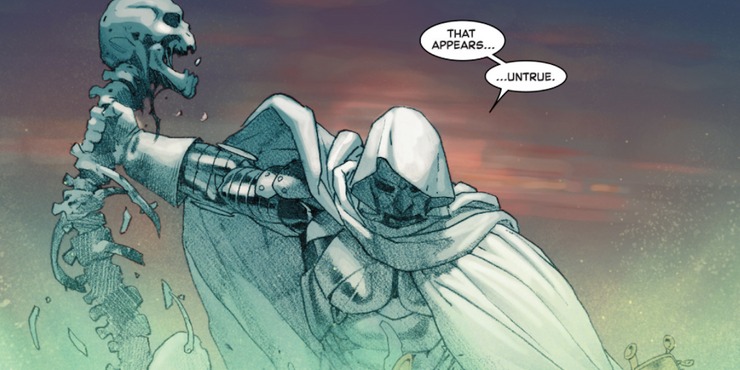
Warning Signs
Even if you think there is a plausible reason for that traitor to want to re-ally you, they could nevertheless prefer to finish you off. I usually presume that a player who has backstabbed me is not particularly worthy of my trust (they betrayed me, therefore they can betray me again). What are the warning signs that confirm this presumption?

- Low Press Effort. Your former ally knows that building trust again will not be easy. If they’re sincere about working with you again, they should put forth a tremendous effort to convince you. If the effort they’re putting into re-allying you is less than what they put into the initial alliance, they are probably not sincere. (They are likely spending their time on other players who they think will last longer than you.)
- A Focus on Learning Your Moves. Previously, I said that the main goal for a double backstab is to gain foreknowledge of the victim’s moves so that they can be attacked more effectively. Accordingly, a player focused on learning your moves is likely employing a double backstab stratagem. If you do agree to re-ally, avoid disclosing your moves (to the extent possible).
- Insistence on Immediacy. Tell your rival that they need to back off their attack before you can trust them again. If they are willing to spend a turn backing away from you before asking any favors, they are probably sincere about re-allying. (Meanwhile, you can make defensive moves just to be safe!) But if they refuse to cooperate with you unless you take immediate action in furtherance of a new alliance (especially if they insist you shouldn’t make any defensive moves), then they are probably just trying to take advantage of you.
- Trust Your Intuition. If your Spider-Sense is tingling, you are probably in danger. There are limitless ways that a human can detect lies, many of which cannot be consciously appreciated—let alone described! Something as subtle as a player’s word choice could be what’s unsettling you, even if you can’t point it out to yourself. If something feels off, they might be attempting a double backstab. In Diplomacy, it pays to stay paranoid.
Thanks for reading!
Footnotes
| ↑1 | If you are familiar with my writing, you will recognize that a double backstab is a type of Trojan Horse alliance. |
|---|---|
| ↑2 | There are many reasons you might want to re-ally a recent traitor. For example, you might want to become a janissary in order to buy time, or you might defend yourself with a Trojan Horse alliance and backstab them right back! That’s all well and good. I’m not going to get into every nuance of patching things up after a backstab; just guarding against the possibility of a double backstab. |


The Servile Ally aspect of the double backstab should be emphasized as much as the Trojan Horse aspect, because it works best when you’re setting up an alliance where your ally is forced to be suicidally servile.
In my first solo win, I was Austria. With Russia divided four ways, England entering the Med and Turkey letting me have three Balkan centers, I yoinked Bulgaria just as Turkey went on the offensive against Italy. Turkey asked me if he could be my janissary in the West, I told him sure, but I wanted to take Sev from him and disband his army so I could move out of Russia, while he went all-in on Italy with fleets. Then in the Spring, I ordered A Sev-Arm and F Gre-AEG.
After the second stab, I explained that the last thing I needed was for Italy to collapse while England was threatening a solo.